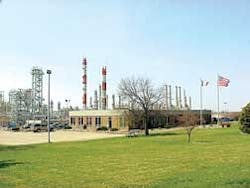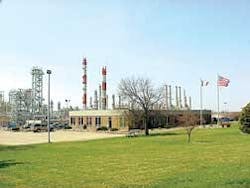Software Helps ID Bad Actor' Machines
Equistar Chemicals LP, Houston, is a $5.9 billion producer of ethylene, propylene and polyethylene. Born out of a 1997 deal between Lyondell Chemical Co., Occidental Petroleum Corp. and Millennium Chemicals, it has 16 manufacturing plants with nearly 3,400 employees. Lyondell, which owns more than 70 percent of Equistar and is the managing partner of the joint venture, also has three manufacturing sites in the United States.
Like many other multi-site companies, Lyondell and Equistar had a mix of systems that tracked and stored data independently, with no way to consolidate or compare it easily. One of the first tasks facing the new management team was to get an accurate grasp of the number and condition of its assets, streamline systems and establish corporate-wide best practices. As part of this company-wide initiative, Lyondell and Equistar adopted SAP as their enterprise resource management system, including the module for computerized maintenance and management.
But that move addressed only part of the problem. The maintenance management software was "really good as far as tracking work history and work orders, costs and all those types of things," says John Scott, principal engineer with Equistar, "but it's not the most user-friendly for reporting capabilities and performing reliability analysis."
Equistar's Clinton, Iowa, plant was the site of the pilot project to track the company's assets, minimize downtime and control maintenance spending.
And that analysis was something the companies really wanted. Reliability improvements were needed to make the company competitive, says Scott. "The more reliable we can be, the more competitive we can be," he adds.
As part of their initiative, the companies established a Maintenance Best Practice Team, which was charged with getting the right structure, processes and information in place across 16 different plants to track equipment failures, minimize downtime and control maintenance spending. The team wanted to accomplish three things: decommission unneeded, obsolete or uneconomical IT systems; build a common repository for all of its historical maintenance data; and use that data analytically to improve reliability.
That's where Meridium Systems came in. Some former Millennium Chemicals staff members already were familiar with the capability of Meridium's asset performance management software and recommended it to fill in the analytical gap in the SAP preventive maintenance module.
"The really big thing we got from Meridium is that in addition to being a query tool for SAP, it pulled together a variety of data sources in one spot," says Scott. "We had data on work order histories and equipment costs going back to 1981, and with Meridium, we were able to load that into the system so it could be a seamless work order/equipment cost history on a piece of equipment from today all the way back to 1981."
According to Bonz Hart, Meridium's president, the software answers crucial questions about plant operation and gives a company a complete database about the life of a particular machine. The system also enables users to determine the best strategy for operating a particular machine and to develop best practices around reliability maintenance.
The software is most helpful, Hart says, in analyzing the big picture and finding the repetitive "bad actors" that cost a lot more than most people realize. Root cause failure analysis is still used to determine the cause of upsets, but it is stored in the Meridium system for future reference so that those mistakes are not repeated and so the analysis is tied together with other data about the equipment.
He adds that the software facilitates such analysis by allowing reliability engineers to query data from their site and others. The process engineers at the Equistar pilot site in Clinton, Iowa, have found the tool especially useful in determining equipment reliability, history and repair cost.
"With all the different things going on in a plant, you get a lot of different recommendations coming in from all over," says Hart. "What we have is one place where you can bring all those recommendations together."
An aggressive rollout
After the successful launch at the pilot site in Clinton, the company settled on an aggressive 14-month rollout to 15 additional sites. Scott explains that a team went site to site, linking Meridium to the SAP system, tweaking the programming to accommodate individual legacy systems, training, rolling out, testing and then moving on to the next site.
This schedule challenged the resources of both Meridium and the two chemical companies. Maintaining it required a lot of teamwork for all three.
"A lot of times when you do software rollouts and process changes, you get into veiled contractor/customer division," says Hart. "We both took a real partnership approach where we were working together, and we were sharing information very freely. We didn't have any of those historic frictions. We focused on getting people using the system, trained and up to speed vs. quarrelling over who does what, when and how."
Satisfactory results
The goal for the Meridium project is a 2 percent reduction in maintenance costs, which represents millions of dollars of cost savings annually. Soft investment return benefits include a proactive maintenance strategy, sharing of best practices, improved decision-making for asset spending and standardized enterprise-wide systems.
The asset performance management software also helps the Lyondell and Equistar companies ensure that reliability engineers are focusing on the right priorities, not just reacting to the problem of the day. A lot of emphasis has been placed on developing and attacking "Top 10" lists. Scott says, "Meridium lets you easily see [which machines] are the true bad actors ," how much are they costing you in terms of maintenance costs and downtime. We've been able to do a good job of systematically finding those and nailing them one at a time. It's really showing up on the bottom line."
For more information about Meridium Systems, Select 495 at www.chemicalprocessing.com/cp/reader_service
